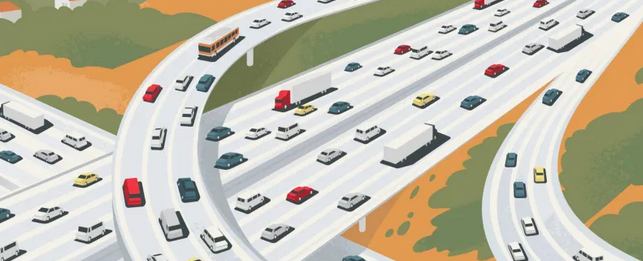A lot of the general public thinks that Metro is all about transit, but this is not the case. Both of Metro's recent countywide sales tax measures - Measure R and Measure M - included extensive funding for expanding capacity on L.A. freeways. There are also other pots of Metro money that fund projects that encourage more driving - especially the "local return" sales tax revenue that Metro passes along to municipalities to use for transportation purposes as they see fit. Nearly all local return goes to projects for cars.
Metro's Highway Program includes many multi-billion-dollar freeway widening projects - prominently the lower 710 Freeway, and upper and lower 5 Freeway - and there are more in the planning stages, including the 605 Freeway Corridor Improvement Project that would demolish hundreds of homes in Downey.
At the urging of its board, Metro has proposed making the Highway Program funding more flexible. The proposal (PDF or track changes version on pages 42-52 of today's San Gabriel Valley Council of Governments Technical Advisory Committee agenda packet) would broaden definitions of what types of projects are eligible for Metro highway funds.
Since the beginning of Metro's rail-building era, transit funds have been used to support car facilities as part of rail construction. This includes park-and-ride, but also plenty of counter-productive road-widening at stations and along rail rights-of-way. In contrast, Highway Program funding was effectively prohibited from paying for bus or bike components of highway projects, although few highway projects have included rail grade separations, which benefit both train riders and drivers.
When the Metro board canceled the North 710 Freeway tunnel project, they directed Metro Highway Program staff to redirect the project funding to corridor city projects that "reduce automobile dependency [and] encourage multi-modal trips." The Metro Highway Program defied the board, instead pushing through two rounds of car-centric projects. Metro Highway staff claim that they are following language approved by voters in Measures M and R.
The new Metro proposal would not mandate redirection of any highway funding, but would allow funding to go to various features that support transit, walking, and bicycling. This would let cities include project components as they see fit.
Metro released its "Modernizing the Metro Highway Program" proposal to L.A. County Councils of Governments in October, requesting input by early December.
So far, the proposal has had a somewhat rocky reception where it has been discussed.
For example, at today's San Gabriel Valley COG Public Works Technical Advisory Committee meeting (archived on YouTube - Highway Program discussion starts at 49:45), SGVCOG Chief Engineer Mark Christoffels expressed concerns that Metro was "misleading the voters." Christoffels stated: "I fear that if that highway portion, for example, gets opened up for active transportation... funds would be hijacked out into something else" - for example "bus lanes" and "bikeways." City of La Verne Director of Public Works Dan Keesey said that highway funding should be used for "what it was intended" and that the COG should "tell 'em [Metro] to f- off."
Christoffels dismissed Long Beach Mayor Robert Garcia's push for active transportation improvements along the 605 Freeway. Keesey responded: "You don't need to worry about that anymore. He's going to go work for Joe Biden," which was met with "Yeah right" from Christoffel and TAC laughter.
City of Industry City Engineer Joshua Nelson clarified that the proposal would not require adding active transportation components to a highway project.
Christoffels asserted that control should not reside with cities, but "at the discretion of sub-regions" - that is, the unelected COGs, one of which is his employer. The SGVCOG comment letter was left to Christoffels to draft.
Community groups have expressed support for the proposed flexibility. Move L.A. Director of Programming and Development Eli Lipmen urged that Metro approve the new policy "because it breaks down silos between different funding programs so that the money is used more effectively to create the best outcomes for L.A. County." But he also stressed that it is "critical that those funding decisions remain at the discretion of local cities and COGs." Lipmen asserts that increasing highway fund flexibility would allow Metro to align projects with the agency's own Complete Streets Policy, Active Transportation Strategic Plan, and First/Last Mile Strategic Plan.
The proposed changes are still working their way through various committees of various Councils of Governments.






